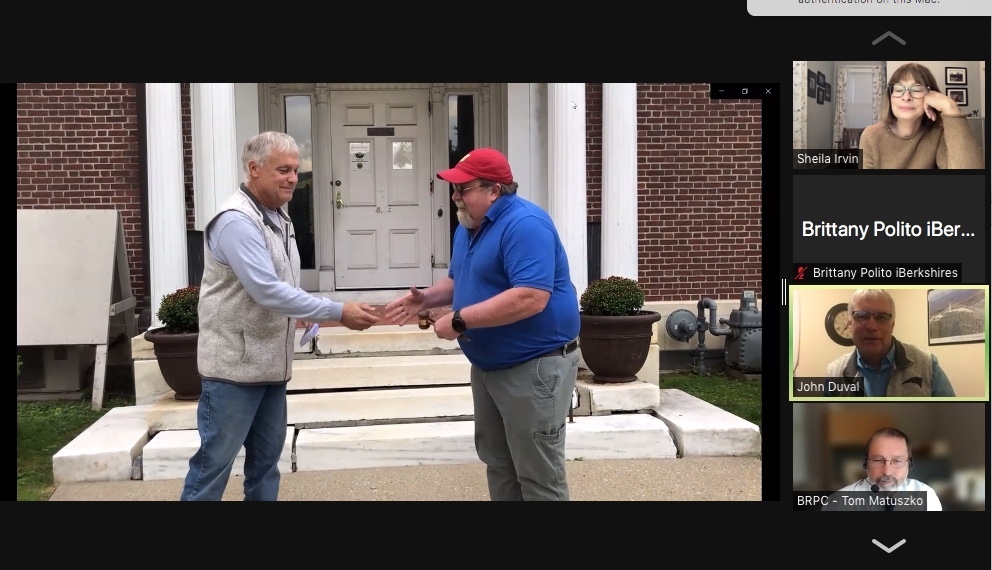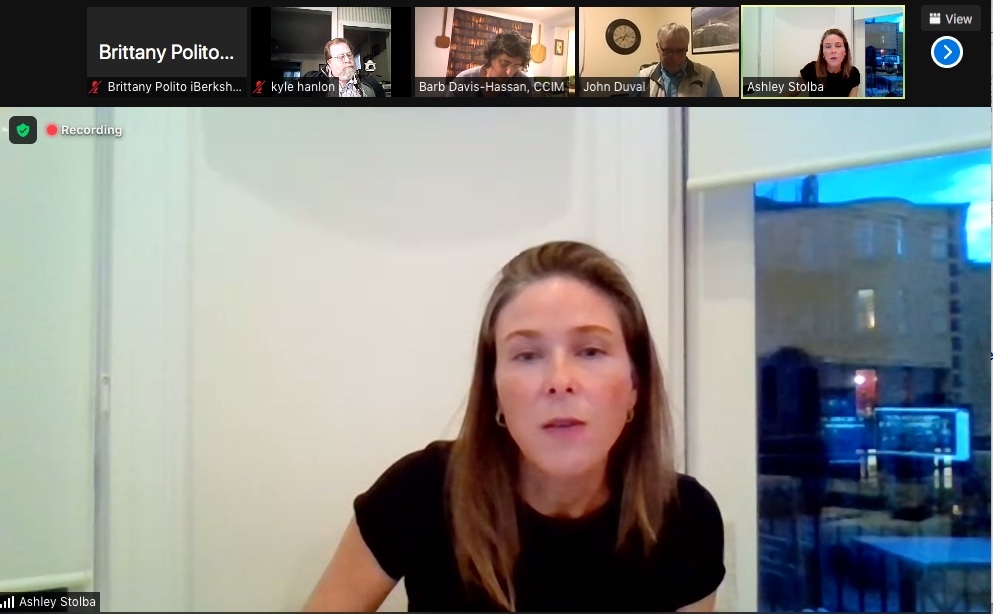BRPC, County Selectmen Hear About Baker-Polito Plans for ARPA FundsBy Brittany Polito, iBerkshires Staff
05:55AM / Saturday, October 02, 2021 | |
 The BRPC's virtual annual meeting includes a video of North Adams Planner Kyle Hanlon, right, handing over the gavel to new commission Chairman John Duval, chairman of the Adams Board of Selectmen. The BRPC's virtual annual meeting includes a video of North Adams Planner Kyle Hanlon, right, handing over the gavel to new commission Chairman John Duval, chairman of the Adams Board of Selectmen. |

Ashely Stolba, undersecretary for community development in the Executive Office for Housing and Economic Development, speaks to the annual meeting of the BRPC and Berkshire County Selectmen's Association.
PITTSFIELD, Mass. — State officials have been hearing the same refrain from small businesses and local officials across Massachusetts: lack of housing, high housing costs and labor shortages.
"I heard the same issues on the Cape as I did in the Berkshires, in the middle of the state in Lowell, in Salem," Undersecretary of Community Development Ashley Stolba told the Berkshire Regional Planning Commission's annual meeting. "Everywhere we went, we've heard really so many of the same issues."
Stolba was the guest speaker on economic recovery at the annual meeting on Thursday that was held in conjunction with the Berkshire County Selectman's Association.
The meeting was held virtually this year and took a hiatus last year, both because of the COVID-19 pandemic that has hit towns and businesses hard over the past year and a half.
The tour was to promote the administration's Bill H.3922, An Act Relative to Immediate Covid Recovery that was referred to House Committee on Ways and Means.
The bill proposes immediate disbursement of $2.915 billion of the state's $5.3 billion allocation of federal American Rescue Plan Act funds to support key priorities including housing and homeownership, economic development and local downtowns, job training, and workforce development, health care, and infrastructure.
It would allocate $1 billion for homeownership and housing production, $900 million for infrastructure investments, $350 million for downtown development and job training programs, $240 million for workforce development and job training programs, $225 million for health care, $100 million for tourism and cultural facilities, and $100 million for increased broadband access.
"What we're hoping to do to scale up existing programs that we already have," Stolba said. "This would make it somewhat easier to spend the money right away because we'd be using programs that we know work and people already love them."
The housing allocations include $300 million dollars in first-time homebuyers assistance, $200 million to the Commonwealth Builder Program to help communities of color build wealth through homeownership, $200 million to fund 2,400 rental housing units, and $300 million to senior and supportive housing with the goal of creating 3,600 units.
But Sheffield alternate Rene Wood wondered if small towns would see any benefit in these programs.
"We have so few homes for sale and no one who is a working person yet afford them," she said. "We're flooded by New Yorkers, nothing against them, but this program while it's wonderful, I don't believe is going to help anyone in our community, I hope I'm wrong."
Windsor delegate Douglas McNally said broadband made his community sell out of houses.
"Basically what happened for years, we had houses on the market, but we built our own broadband network and the minute broadband was available, every home that was on the market sold and it sold above the asking price and right now, the time on the market in the town of Windsor is under three days," he said.
"The problem is that small towns like Windsor, where we have a zoning because everything is well water and septic, and so on, you can't get a home cheap, you don't have town water, town sewer or anything like that, so you can't put in apartments."
The town of Mount Washington is reportedly experiencing an Airbnb problem in which people are building houses and putting in small apartments without permits to rent through the online company.
Lanesborough delegate Barb Davis-Hassan said the rental market has been "absorbed by the Airbnb market."
In Stockbridge, the town is struggling with offering affordable housing because it has minimum four-acre zoning.
The workforce development proposal would allocate $150 million for workforce credentials for entry and mid-level wages, $35 million to fund English for Speakers of Other Languages programs and Adult Basic Education, and $25 million for work readiness and essential skills programs.
Mount Washington alternate James Lovejoy explained that really small towns struggle with having staff to manage grants, which makes annual funding such as state Chapter 90 favorable.
Andrew Hogeland of Williamstown, of the Berkshire County Selectmen's Association, encouraged the administration to build in a lot of flexibility for these programs because of the varying community sizes in the state that have varying needs.
"I want to make sure that there are funding programs that actually appeal to a lot of small towns, because especially given where we are, among the four western counties," he said.
"There's a lot of very small towns, and they just can't take advantage of these programs so the more that designers of these programs keep those communities in mind, I think that we appreciate that very much."
During this meeting, the Kusik Award named after the late Charles Kusik was presented to the Berkshire Vaccine Collaborative and the COVID-19 Emergency Response Fund for Berkshire County for providing vital services to the county throughout the COVID-19 pandemic.
The Berkshire Vaccine Collaborative was responsible for around 90,000 vaccinations from January through June at three locations in Northern, Central, and Southern Berkshire County.
Northern Berkshire Emergency Planning Committee member Amalio Jusino and Chief Executive Officer of Community Health Programs Lia Spiliotes accepted the award on behalf of the vaccine collaborative.
"In my many years of emergency management, I've never worked with such a great group of consummate professionals," Jusino said about the collaborative. "Their commitment, passion, dedication, empathy, and drive to cure in the world from this little place in Massachusetts was and continues to be unmatched."
Spiliotes said the collaborative was able to reach people at the vaccination sites and from the mobile health units that were deployed into the community for greater accessibility.
"We were able to do things on two fronts: one was we were able to get people to the three locations and make it easy for them and help them along, but we were also able to take vaccines out in the first four months that vaccines were available, we did about close to 5,000 vaccines on the mobile health unit and we continue to do vaccines on the mobile health unit, and in a year from this month, we'll have a fleet of three mobile health units," she said.
"It's our hope that we can use what we have to complement all the other health agencies and health-care providers in Berkshire County that work so hard together, and that we can do something to really supplement and aid them in delivering care because at the end of the day, the people that we care about, the people that are important to us have very great needs in this community and all of us are there to support them."
Williamstown Community Chest Executive Director Anna Singleton, Northern Berkshire United Way Executive Director Christa Collier, Berkshire Taconic Community Foundation Program Director Maeve O'Dea, and Berkshire United Way's Director of Volunteer Engagement Brenda Petell accepted the award for the COVID-19 Emergency Response Fund for Berkshire County.
Since March 2020, the COVID-19 Emergency Response Fund for Berkshire County coordinated around $2 million through 132 grants to 95 nonprofits with a wide range of services.
It is co-led by Berkshire United Way and Berkshire Taconic Foundation in partnership with Northern Berkshire United Way and the Williamstown Community Chest.
"We decided at the beginning of this, March 19, that we needed to come together and mobilize all our resources and put forth into action what we do best, we needed to support our grantees, our community partners, and our member agencies, and establish this fund and get it up and running," Collier explained.
"And by joining forces as the philanthropic organizations in Berkshire County, we really served as the bridge builders, we didn't initially know this at first but we were really able to form partnerships, we were able to be instrumental, and building trust within the communities we serve."
| 
